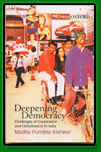 |
| |
|
|
|
|
| |
Submissions |
| |
Basic Guidelines for Submissions
We
prefer articles submitted in an electronic document
via e-mail, though neatly typed hard copy double-spaced
articles are also accepted. Please retain a copy
of what you have sent for your own records, as
we cannot guarantee its return, though we will
try our best if you send return postage.
The
writing we seek includes work that:
| • |
Brings new, important, neglected or unexplored
information to light. |
| • |
Focuses
on concrete life situations and struggles
of specific groups of people, especially
women, in different regions and communities. |
| • |
Presents original work or new translations
of analytical articles, stories, poetry
and reports of important events from regional
languages. |
| • |
Offers profiles (not hagiographies) of
people, especially women, whose lives
have been inspirational for others. |
| • |
Provides
realistic down-to earth accounts of important
social movements and the work of significant
organizations after an in-depth study. |
| • |
Offers
critical insights into our cultural and
civilisational heritage which counter
simplistic stereotypes currently prevalent
in academic and popular discourse. |
We avoid articles:
| • |
That rely mainly on sweeping generalizations
and unsubstantiated opinions; |
| • |
That strengthen existing stereotypes –
negative or positive. |
| • |
That describe struggles and movements
in a manner whereby inconvenient facts
are swept under the carpet to present
an unrealistic rosy picture. |
Advice for First Time Authors
Every
article does not have to contain a history
of the entire subject – for example,
in an article on a women’s rights
organization, you need not include a lengthy
discussion on the world wide or all India
wide women’s movement. That may
be important for a class report, where
you need to show your instructor that
you did some background work. In writing
for Manushi, you should instead restrict
yourself to the particular topic you have
researched, and about which you have some
new information or fresh insights not
easily available elsewhere.
Swift reviews giving names and dates of
prominent people, without more than superficial
generalizations about their mission, or
the reasons they were honoured, do not
make enough of a contribution to be worth
publishing. You need to go into the person’s
contribution in concrete detail that indicates
what it is significant about the work
he/she did.
A description of a movement or person
should include enough specifics to insure
that Manushi readers are not just reading
a rehash of some survey article published
previously elsewhere. The author should
know the region discussed, have personal
access by interview or participation with
the persons and movement described.
The article should have some connected
point or points to make in its conclusion;
it should not end with a few paragraphs
carelessly strung together, without a
logical exposition. The points it wishes
to make should be sufficiently different
from commonly held views on the subject,
be informative, useful and interesting
to justify publication.
|
|
|
|
|
| |
| Music
Cassettes |
| Latest
from Manushi |
| • Deepening Democracy |
Challenges
of Governance and
Globalization in India
(Oxford University Press)
MADHU PURNIMA KISHWAR |
 |
Deepening
Democracy brings together essays on enduring
issues such as human rights, governance,
and the impact of globalization on the Indian
citizen. The covers a range of issues from
a glimpse of the License-Permit- |
|
Raid Raj as
it affects the livelihood of the selfemployed
poor, to a critique of India’s farm and
economic policies. It further discusses the new
divides being created by the country’s language
policy to the causes and possible remedies for
ethnic conflicts in India (Read
More…) |
| |
| •
Women Bhakta Poets: |
Contains
accounts of the life and poetry of some
of the most outstanding women in Indian
history from the 6th to the 17th
century — Mirabai, Andal, Avvaiyar,
Muktabai, Janabai, Bahinabai, Lal |
 |
|
Ded, Toral,
Loyal. Many of these poems had never neen translated
into english before (Read
More…) |
| |
|
|
|

